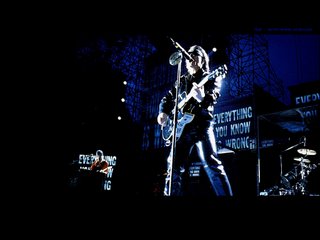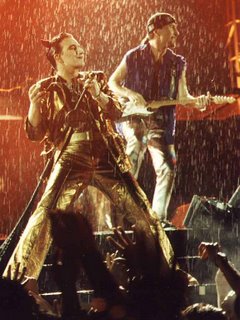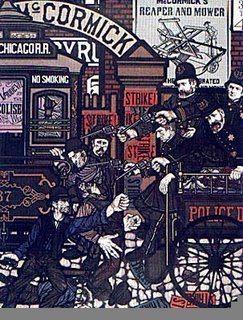The future isn’t a place we’re going. It isn’t even a time we’re going. There is no future. Everything you think about the future is exactly that – a thought, an imagination, a fancy little construct you’ve built for yourself. There is no future.
Monday, May 06, 2013
The End
The future isn’t a place we’re going. It isn’t even a time we’re going. There is no future. Everything you think about the future is exactly that – a thought, an imagination, a fancy little construct you’ve built for yourself. There is no future.
Thursday, October 06, 2011
From an honest life to a hospitable life

Tuesday, October 04, 2011
Every Story Is Made Up

My tweeted stories of God

Tuesday, March 09, 2010
Lexikon - scattered words on words

Wednesday, December 16, 2009
They knew the sky like the back of their hands

Mind Body Lips

Monday, May 19, 2008
Special Guest at ikon

Wednesday, February 13, 2008
To the Powerful
Wednesday, September 12, 2007
Miracle

Tuesday, June 12, 2007
Epoché: an ikon liturgy

Tuesday, May 22, 2007
Ravelling

Such a great Ikon gathering on Sunday night, titled ‘The God Delusion’. Here is the piece I read.
UN/RAVELLING
To Fear Unravelling
Here I am unravelling!
It began with a doubt. A tickling thread, an element itching. Not much, but at the time I wanted it gone; I prayed for it to disappear.
Unravelling. Some early questions coming out of the fray: How can I claim to know God? How can I comfortably address Infinite-God in prayer? What is my faith made of?
This doubt was mocking me: ‘You live your family inheritance! You’ve invested so much you can’t let it go! Your identity is tied up in Christendom - pull this thread and you will be nothing!’ Mocking little, dangling thread of doubt.
The thread. I couldn’t ignore the itch. Should I snip it off and pretend it never existed? Or should I pull it and examine my reasons for belief? I would pull it until it stopped. My faith would find its form and still keep me warm. It would stand up to the test. I would tug this thread and come out stronger.
I came out weaker.
Every question led to another. Each answer was teased apart showing its own presuppositions. Every new experience I was open to, and every stranger I met, pulled at the thread. I was unravelling, and I was unravelling fast. What would be left?! Filled with doubt. Filled with uncertainty. Filled with failure.
That’s how it started, this unravelling.
To Revel in Ravelling
But unravelling and ravelling, I was both. They mean the same thing. I started to see that unravelling didn’t need the negative appendage, the un- prefix. As if unravelling were to be avoided, to be considered the ruin of my belief, my faith’s fall.
My Christ-encounter had become meshed in interpretation, and tangled in my inheritance (church, theology, psychology, politics). My ‘becoming-Christ’ had become ‘Christian’ (in all its woollen glory). But rather than unravelling these threads to expose an embarrassed belief, this ravelling disentangles the web of confusing adornments and décor to make room for the next encounter.
Ravelling. Disentangling, not collapsing. My faith didn’t unravel, it ravelled. They mean the same thing. It wasn’t the end, it was the beginning of something… I learned to revel in ravelling. The questions proclaim more than the answers. The searching confirms that there has been revelation. The hunt for an unattainable treasure confirms that we have found it. Tearing apart what I love is evidence that I love it.
Filled with doubt, for what is faith without it?! Filled with uncertainty, and my remaining beliefs are held lightly; an ensured humility. Filled with failure; failure to grasp God, forever failing.
I am ravelling.
And the story continued on...
Where does your faith lie? ;-)
Sunday, May 06, 2007
Forced Hypocrites

Sunday, April 29, 2007
Angry At God For (Not) Existing
The spectrum of sounds on Modest Mouse’s We Were Dead Before The Ship Even Sank is a delight. The opener, March Into The Sea swells into the listener’s ears setting the scene, the pop driven Dashboard follows, stackfulls of syncopated guitars, and of course there’s plenty of manic screams and vocal weirdness from the front man throughout. They’re also a band who know how to pull at our heart strings with the likes of the contemplative People As Places As People and Missed The Boat (featuring the honeysweet vocals of Shins’ singer, James Mercer).Lyrically, with endless gems that raise a smile, Brock hovers around thoughts of mortality and mundane existence: “Someday you will die and somehow some thing or someone steals your carbon”, “Let’s shake hands if you want but soon both hands are gone, ah-ha-ha!”. Science gets sarcastically mocked as it is incapable of answering all the singer’s questions (“We’ve got everything down to a science, so I guess we know everything!”), while a certain sympathy is offered towards religion - though he confesses, and asserts the challenge on to us, that “we listen more to life’s end gong than the sound of life’s sweet bells”.But life isn’t hollow despite its brevity. Brock lets us know where he sees the value in his short cycle of life before he “dehydrates back into minerals”- it is in the people around him who he has “loved but didn’t quite know”; he talks of people as “places he wants to go”, and describes a beautiful moment he shared with someone when “the remainders of a shooting star landed directly on our broke-down little car. Before then we had made a wish that we would be missed if one or another just did not exist”
“All the reasons I gave were just lies to buy myself some time”
And then The Arcade Fire. The rough cuts, the pulsing four-on-the-floor kicks, the handclaps, the “Heys!”… Their music is just bursting with joy from inside its brokenness. Neon Bible has had its doubters - some unimpressed uber-cool indie kids - but whatever, this is an epic and glorious record. Sure, perhaps nothing will impact us quite like their first album, Funeral, having come out of nowhere and telling the story of our lives so accurately, but Neon Bible is still incredibly striking.Butler paints a bleak picture through Neon Bible with talk of houses on fire, falling bombs, World War III, planes crashing “two by two”, and how “the tide is high and it’s rising still”. He describes how we’re “living in an age that calls darkness light”, where nothing is straightforward (“a vial of hope and a vial of pain, in the light they both looked the same”) and where “the lions and the lambs ain’t sleeping yet”. Religious imagery like this is dotted throughout, as is his frustration with his Divine. In a number of songs he aims anger up and mocks heaven (“Oh God! Well look at you now! Oh you lost it, but you don’t know how! In the light of a golden calf, oh God! I had to laugh!”); though we shouldn’t be surprised after the tragic irony of “working for the church while your family dies”.Yet, for Butler, there is always something more, some meaning to life, some hope beneath this desolate perspective. The lyrics suggest his sensitivity to divine touches (“In an ocean of noise I first heard your voice, ringing like a bell”), and he speaks of being “resurrected” to “live in a lighthouse” having spent time in a gloomy well, which acted as his prison where “only the moon was shining back”. Most often, though, this feeling of hope is carried through the music, sweeping past the listener in landscapes of strings and rusty guitars and through the pipes of church organs. The Arcade Fire have a sound quite unlike anyone else I have come across. The structures are unique and fun, the voices balance boldness and fragility, the sound is dramatic… I can’t quite put my finger on it, but somehow, out through the rough edges comes a captivating magic.These bands have brought out the fan in me, that part of my insides that has remained hidden for many a year. Both records are excellent- I can’t stop listening to them and fear I will wear them out. All homes should have a copy!
Friday, March 16, 2007
To the Earth! And all who sail in her, and fly in her, and drive in her...

Wednesday, March 14, 2007
Quantum Graffiti


Sunday, March 04, 2007
"You hated Vietnam, but you dig Afghanistan"

From Afghanistan the Bloodiest Field for Slaughtering Human Rights"No doubt the war on terror toppled the misogynist and barbaric regime of Taliban. But it did not remove Islamic fundamentalism, which is the root cause of misery for all Afghan people; it just replaced one fundamentalist regime with another.Five years have passed since the so-called "democratic" government of Hamid Karzai has been installed but the depth of tragedy and miseries of Afghan people still remain intact. Unlike what is being shown in the media, RAWA and other human rights organizations like Amnesty International and Human Rights Watch paint a very different picture of Afghanistan.Just the increasing amount of women who commit suicides by burning themselves can be the best example of a human rights violation in Afghanistan. According to UNICEF, 65% of 50,000 widows in Kabul think that committing suicide is the only option they have.US bombs, B52s and the presence of thousands US troops is not to meant to bring about liberation or establish democracy in our country. The people of the US should know that their troops only serve the strategic interests of the US government and make things worse in Afghanistan. Liberation should be achieved by the people of a country and they must fight for their own liberation."
"You hated Vietnam, but you dig Afghanistan" (Cester, Cester, Wilson, Muncey)
Tuesday, February 27, 2007
Black Rebel Motorcycle Club @ The Village, Dublin 26/2/7
Sunday, January 28, 2007
Mentalcase

Depression is sweeping the nations, if the U.N. is to be believed. A newly recognised type of bi-polar disorder has been added to the DSM-IV (Bi-Polar 2, where the manic episodes aren't so manic...). Crime is frequently pathogenic, leaving victims suffering dibilitating side-affects of PTSD. Schizophrenia, psychosis, anxiety disorders, OCD... Everyone is crazy. Apparently mental illness is the biggest cause of disability in the USA. I wouldn't be surprised if it's similar here.
By the way, I'm as crazy as the rest of you with my bouts of rage, depression and sleepless nights.
Or are we all just victims of a society so individualised, so pathologised, that we can't handle simple pressures of life without giving it a medical explanation? Do the mental health services (let alone the pharmaceutical industry!) fool their way into business by convincing us and themselves of their importance? The 'therapeutic state' as it is known...
Culture differences are there to be seen - some commentators simply could not believe that the local population were mentally stable after the tsunami struck...
"One mental health specialist, reporting live on radio from a Sri Lankan village, expressed his surprise that the children he encountered seemed keener to return to school than talk about their experiences. They were, he told the listeners, 'clearly in denial', and 'only later will they experience the full emotional horror of what has happened to them.' How he knew this was not stated." (from a BMJ book review)
Cultures are different. Our broken legs look the same, but our mental status cannot. Psychiatry is perhaps 90% in the mind, 10% the brain, and so our mental status is massively influenced by our upbringing, our affluence etc. Our ways of coping with trauma and stress are very different - evidence, some argue, that we in the West are dangerously medicalizing our society. We have lost the role of community, common goals, maybe even religion, in getting through the tough times that life always throws our way and in our recovery from traumatic events.
Of course, it should go without saying, that some people are in need of mental health care, and they should get it.
Monday, January 08, 2007
The Cinema Experience

Don’t download poor quality movies - pay for the bad experience at your local cinema.
Apparently one of the cinema screens at The Odyssey has been revamped. Now each member of the audience can sit back and relax into their own lazy-boy leather seat and order drinks through the waiter service. Hopefully the sound and picture are well presented as well. I mean, when you pay big bucks for that kind of treatment, it better be good.
Surely it should always be at least half decent. Last year I vowed never to return to Enniskillen’s Omniplex until they sorted their shit out. In four consecutive visits I was disappointed one way or another - picture out of focus, sound desperately quiet, hissing/crackling speakers… Call me grumpy, but when I pay five quid to see a film, I want it to be enjoyable. Ideally I would like to be overcome by the film, without a thought for the outside world. But that’s just never the case. And no, I don’t want to miss some of the film to tell the morons to get it together - that’s their job.
At Yorkgate last night I saw ‘Flags of our Fathers’. I won’t comment on the film ‘cause this is rant about the cinema experience. The bloody thing was out of focus. This time, someone even mentioned the problem to a member of staff who was milling about in the theatre. But they still failed to fix it. What does it take? And even if they nailed the picture perfectly, I’m sure the place didn’t have surround sound, the screen was tiny, and, yeah while I’m at it, the seats were a bit cramped. :)
I think I know why it’s all so duff. The cinema going public here don’t care. At the first sign the film was over, the masses of Belfast scrapped and yelped their way to the doors, missing what I thought was a revealing series of photos from some old WW2 archives. And the bloody brooms and rubbish bags came in while we remained, creeping around behind us, basically urging us to leave the theatre. So much for getting lost in the film. This crap wouldn’t go down in America!
Monday, December 04, 2006
HMS Vanguard


Friday, December 01, 2006
Saturday, November 11, 2006
Welcome to ZOO TV, y'all

"YOU HAVEN'T COME ALL THE WAY OUT HERE TO WATCH TV NOW, HAVE YA?!"

REBELLION IS PACKAGED / EVOLUTION IS OVER / ENJOY THE SURFACE / KIDS BLOODY KIDS / EVERYTHING YOU KNOW IS WRONG
"HAVE YOU COME HERE TO PLAY JESUS? I DID"

"TAKE MY HEART. IT'S BLINDNESS"

Tuesday, October 24, 2006
if fashion had a conscience, would it really look like this?
Coming soon to a Caswell near you...



Friday, October 13, 2006
paraskevidekatriaphobia
Do you suffer? Stay inside and lock the doors!
No, wait, don't lock the doors...
Oh, I don't know! God you bless you child!
thoughts of a poorly educated hollywood actor
Thoughts of a poorly educated Hollywood actor
or
The surest way to corrupt a youth...
or
Every theory is autobiographical
or
We are all wrong
"The surest way to corrupt a youth is to instruct him to hold in higher esteem those who think alike than those who think differently."
Friedrich Nietzsche, The Dawn, Sec. 297
Thursday, October 12, 2006
bus





